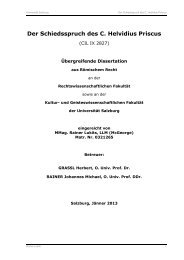(post) Keck Case Law on the Freedom to Provide Services
(post) Keck Case Law on the Freedom to Provide Services
(post) Keck Case Law on the Freedom to Provide Services
Create successful ePaper yourself
Turn your PDF publications into a flip-book with our unique Google optimized e-Paper software.
(b) Liberalisati<strong>on</strong> of Intra-Uni<strong>on</strong> TradeIt has been shown that <strong>the</strong> Court used <strong>the</strong> c<strong>on</strong>cept of “market hindrance” <strong>on</strong>ly in veryspecific situati<strong>on</strong>s. Moreover, <strong>the</strong>re is, in my view, no doubt that <strong>the</strong> Court did not want <strong>to</strong>change <strong>the</strong> underlying aim of Art 34 TFEU: <strong>the</strong> liberalisati<strong>on</strong> of intra-Uni<strong>on</strong> trade.A.G. Kokott c<strong>on</strong>vincingly argued in Mickelss<strong>on</strong> and Roos that if “hindrance” of marketaccess is interpreted in a broad way, every restricti<strong>on</strong> which leads <strong>to</strong> any decrease of sales– like <strong>the</strong> prohibiti<strong>on</strong> <strong>on</strong> driving cross-country vehicles off-road in forests – wouldc<strong>on</strong>stitute a measure having equivalent effect. 74 Even though <strong>the</strong> Court did not expresslyfollow her argument and used <strong>the</strong> str<strong>on</strong>g language of market “hindrance”, <strong>the</strong> decisi<strong>on</strong>sdid not in substance depart from <strong>the</strong> A.G.`s opini<strong>on</strong>. First, as discussed above, <strong>the</strong> Court<strong>on</strong>ly decided that <strong>the</strong>re was a breach of Art 34 TFEU in a very specific sort of cases(ec<strong>on</strong>omic ban of <strong>the</strong> sale of a product). Sec<strong>on</strong>d, <strong>the</strong> decisi<strong>on</strong>s did not include anysuggesti<strong>on</strong> that <strong>the</strong> Court wanted <strong>to</strong> depart from its past rulings. On <strong>the</strong> c<strong>on</strong>trary, <strong>the</strong>decisi<strong>on</strong>s frequently refer <strong>to</strong> <strong>the</strong> established case law and do so in an affirmative manner.This questi<strong>on</strong> of c<strong>on</strong>sistency with past case law is closely c<strong>on</strong>nected <strong>to</strong> <strong>the</strong> questi<strong>on</strong> of <strong>the</strong>general aim of Art 34 TFEU. As A.G. Tesauro famously asked in Hünermund:“Is Article 30 (now Art 34) of <strong>the</strong> Treaty a provisi<strong>on</strong> intended <strong>to</strong> liberalise intra-Community (now intra-Uni<strong>on</strong>) 75 trade or is it intended more generally <strong>to</strong>74Opini<strong>on</strong> of A.G. Kokott in <str<strong>on</strong>g>Case</str<strong>on</strong>g> C-142/05, Mickelss<strong>on</strong> and Roos, [2009] ECR I-4273, paras. 42-45.75With <strong>the</strong> Treaty of Lisb<strong>on</strong> <strong>the</strong> Uni<strong>on</strong> replaces and succeeds <strong>the</strong> Community (Art 1 TEU). See <strong>to</strong> that24




